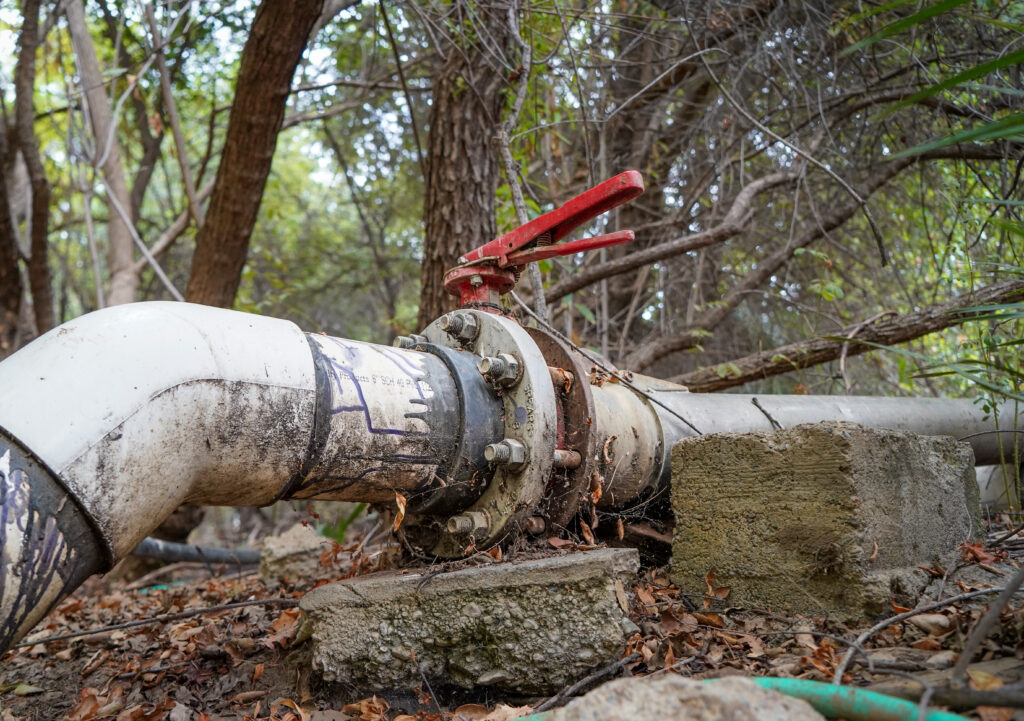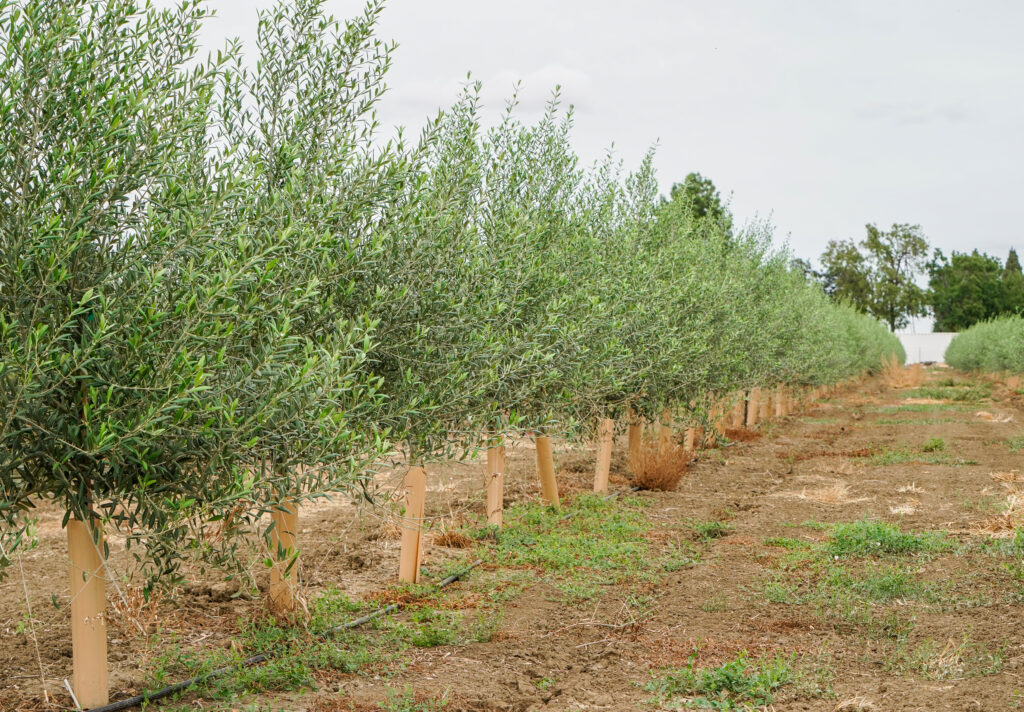The Abridged version:
- After Annie Main and other local farmers raised concerns about recent strain on the water system, the Yolo County Board of Supervisors voted to implement and later extend a moratorium on permitting new agricultural wells in parts of the county.
- As corporate farms move in, some in the county see the action as a temporary fix to a bigger land use challenge.
Lately, the sound of tractors has been keeping Annie Main up at night.
Just down the road from her 30-acre organic produce farm, a 624-acre plot is being converted into what will eventually be a vast olive orchard. To prepare the soil, the international corporation that owns the land runs machines day and night. When it’s done, hundreds of neat rows of olive trees will sit on land that was previously unfarmed.
It’s not just the noise that has kept Main awake. Her corner of the county, a place set against the golden hills that separate Hungry Hollow from the Capay Valley, relies on an aquifer that faces increased demand. In the last year, four wells have gone into the property near Main’s. That land belongs to Cobram Estate, a company from Australia that sold about $42.5 million worth of olive oil in the United States in 2025.
After Main and other local farmers raised concerns about strain on the water system, the Yolo County Board of Supervisors voted to implement a moratorium on new agricultural wells in portions of the county until Oct. 10. In early October, the board extended it into 2026, an action that some in the county see as a temporary fix to a bigger land use challenge.
The moratorium has spotlighted a central tension in the county. Farmers need groundwater to sustain their livelihoods, but increased pressure on the aquifers has caused some to worry about the survival of their farms.
“I listen to the tractors and I stay up worrying about the future of our farm, the future of this neighborhood,” Main said.
Depleted wells disrupt everyday life

Everything at Good Humus Produce revolves around its lone well. With its water, Annie, her husband Jeff Main, their children and grandchildren wash dishes and flush the toilets. They draw on it to irrigate their crops, which they have been selling at the Davis farmers’ market since they helped cofound it in the late 1970s.
But as the years have passed, the well’s water level has dropped. Main said the water was about 100 feet down in 1976. By 2015, it sat 181 feet beneath the surface. Now, a few droughts later, it’s 200 feet down.
Each time they have to lower the well, it costs thousands of dollars and interrupts their only access to a reliable water source.
“Everything shuts down,” Main said.
For now, they don’t have to worry about digging a new well because their current one descends about 480 feet, hundreds of feet below the current water level. But that hasn’t been the case for everyone.
Main said that 17 of her neighbors have had issues with their wells recently, four of whom had to dig entirely new replacements, which can cost tens of thousands of dollars.
Though intensifying droughts over the last decade have played a role, Main and her neighbors have also watched as well-resourced companies purchase nearby, unfarmed land and plant swaths of thirsty trees.
“We have seen a big increase in land conversion, and a lot of it is since 2015,” she said.
Along with the new Cobram Estate olive orchard, there is an existing 158-acre almond orchard down the road owned by a company from Indiana. Up the road is another olive orchard owned by the Australians, as well as acres upon acres of almonds and pistachios owned by companies with business addresses outside of Yolo County.
“If you drive the valley here up to Dunnigan, it’s almond orchard after almond orchard after almond orchard, and grapes and now olives,” Main said.
Yolo County is ideal for Cobram Estate’s olives

Justin Smith, vice president for business development and industry relations for Cobram Estate USA, said that Yolo County is the perfect environment to grow olives.
“It’s the ideal growing conditions for olives in the world,” he said.
Hungry Hollow in particular, with its hills that shelter crops from the April frost, is an area that Cobram Estate has identified as a focal point of its rapidly expanding operation.
In September, the company announced to investors that it intended to sell about $122 million worth of shares to support its purchase and development of just under 4,000 acres for orchards, a large portion of which will be in Yolo County. To sustain those plans, which will move the company toward its goal of just under 9,000 acres in the United States by 2027, they need access to water.
The four new wells Cobram drilled for the orchard near Main’s farm will mainly be backup for the years they don’t have enough surface water from the nearby canal, said Conor Churchin, chief operating officer of Cobram Estate USA.
“They’re a lifeline,” Churchin said. “So when we have years of no water, we can call on the well to keep the trees alive.”
Fritz Durst, whose family has been farming in Hungry Hollow since the 1800s, said that a farmer can expect a full water supply in the nearby canal roughly seven out of 10 years. In the past, farmers dealt with the remaining dry years by adjusting their crops or letting the fields go fallow. But that’s not an option with a perennial crop.
Olives, along with almonds and pistachios, are perennials, meaning they survive after harvest and require tending year-round. Once planted, the trees that produce the fruit must be kept alive year after year with at least two acre-feet of water. For context, one acre-foot is enough to cover an area roughly the size of a football field with a foot of water. In wet years, that’s not usually an issue. But in dry years, when access to surface water is limited, farmers lean heavily on groundwater to maintain their orchards.
Durst is worried that the vast new plantings in Hungry Hollow will draw on what he thinks is an unsustainable groundwater supply.
“All we’ve gotta do is look to our fellow farmers to the south to see how bad it can be,” he said, referring to widespread water access issues and rapid sinking of land in the San Joaquin Valley due to overpumping of groundwater.
Durst already sees some concerning signs. Just a few miles from his farm shop, there’s a spot in the road that he said has been repaired multiple times due to land subsidence, or sinking that can occur when an aquifer is depleted. Other farmers he knows near Zamora, Rachael and David Long, have had to replace a well on their land because subsidence destroyed the well shaft underground, rendering it useless.
Water concerns reach beyond Hungry Hollow
Main and Durst are not alone in their concern about increased demand on the county’s groundwater. About 15 miles northeast of her farm lies David Schaad’s land. Schaad, a fifth-generation farmer and president of the Dunnigan Water District Board, has been wondering where the tipping point will be when it comes to his region’s water.
Schaad’s land, and many of the farms surrounding it, benefit from the existence of the Tehama-Colusa Canal, which brings surface water from the Shasta Dam into the Sacramento Valley. Access to the canal has meant that landowners in the Dunnigan Water District have been able to avoid relying solely on groundwater for their crops.
“With management and common sense, it’s been a balance,” Schaad said.
But when he looks beyond the boundaries of the Dunnigan Water District, which covers just under 16 square miles in and around the town of Dunnigan, it’s a different story.
Acres of perennial crops blanket the hills just west of town, where any type of natural groundwater recharge is next to impossible. Schaad is proud of the work that the water district has done to try to recharge its aquifer, the benefits of which extend beyond the district’s borders.
“They’re benefiting from our recharge work,” he said, as the compacted soil in perennial orchards does little to capture any potential rainwater or beneficial runoff.
Schaad said he planted some almonds a few years ago but decided to stop when he saw how much water they still needed during a drought year.
“The water table might go down, but the water demand doesn’t,” he said.
He worries that the water issues that have disrupted farming in the San Joaquin Valley will emerge here, especially if orchards keep being planted in places without access to surface water.
“We can make a quick buck, but what’s the impact to the next generation?” he added. “I’m here because I have a bond with the property. It depends on me, and I certainly depend on it.”
Thinking about Yolo County’s future
When Annie Main thinks about the future of her land, she doesn’t think about how to expand her footprint or maximize her profits. She has already entered her land into an agricultural easement, a step that permanently preserves it as farmland and ensures that a payday for its development potential won’t be coming.
What she thinks about is her descendants five or six generations from now. Will they still be able to harvest tomatoes, apricots, flowers, cherries and watermelons from this corner of Yolo County? That will depend on water that, for the time being, is dropping further and further into the earth.
Editor’s note: This story was updated on Tuesday afternoon after the Yolo County Board of Supervisors voted to extend a moratorium on new agricultural wells in portions of the county.
Correction: An earlier version of this story misstated Cobram Estate’s olive oil sales in the United States. The Australian company sold roughly $42.5 million worth of olive oil in the U.S. in fiscal year 2025. This story was updated at 3:40 p.m. on Oct. 7, 2025.
Daniel Hennessy is a reporter covering Yolo County at Abridged.
